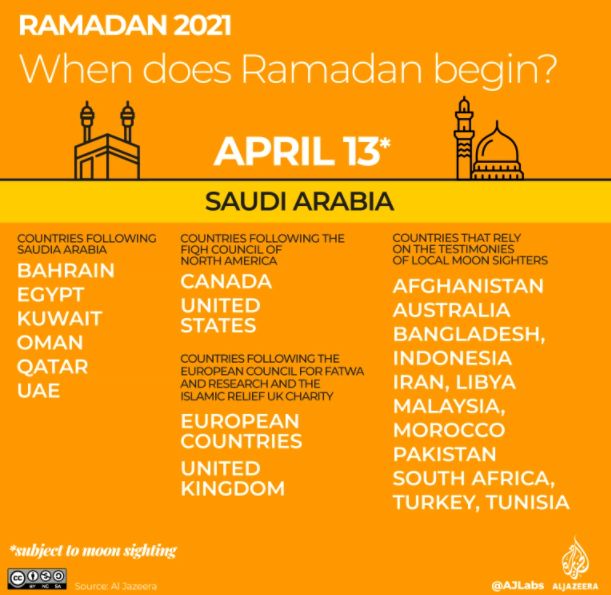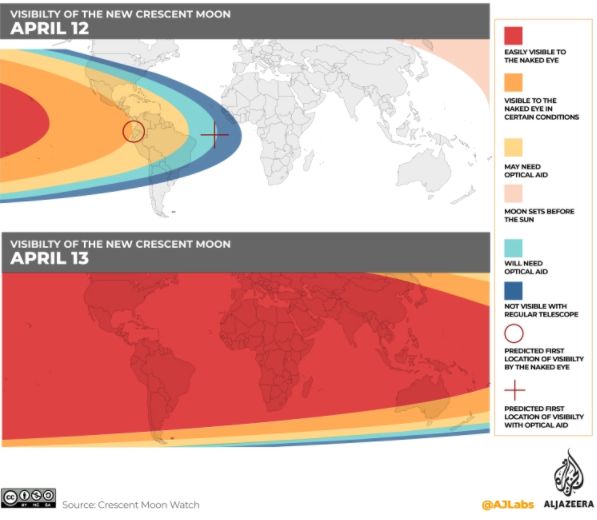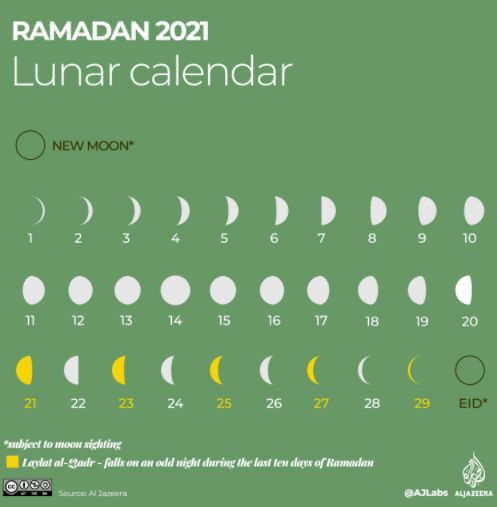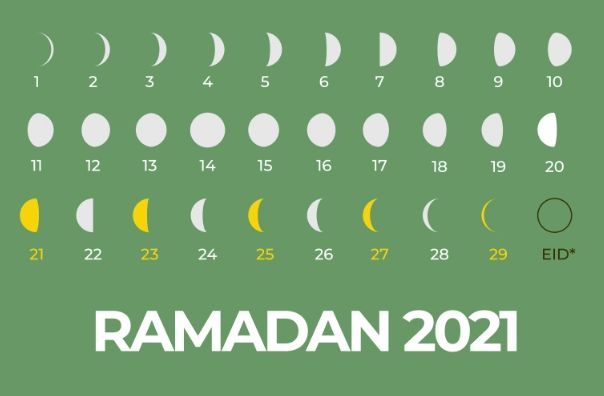The first day of fasting for the holy month of Ramadan, which is determined by the sighting of the new moon, is likely to be Tuesday, April 13.
To declare the beginning of Ramadan, Saudi Arabia and other Muslim-majority countries depend on the testimonies of local moon sighters.
Bahrain, Egypt, Kuwait, Oman, Qatar and the United Arab Emirates are all expected to follow Saudi Arabia’s sighting of the new moon.
Other countries have independent sightings, but Indonesia, Lebanon, Morocco and Syria are also likely to begin fasting starting Tuesday while countries further east and west will commence as the moon is sighted.

When can we see the new moon?

The Qatar Calendar House (QCH) has announced that Ramadan’s new moon will be born on April 12 at 02:31 GMT, according to astronomers. On that day, the moon might be visible in parts of North, Central and South America. On April 13, the moon will be easily visible in most parts of the world.
The actual visibility of the crescent will depend on factors such as atmospheric conditions, cloudiness and the distance between the sun and the moon on the horizon.
The moon phases of Ramadan

Lunar months last between 29 and 30 days, depending on the sighting of the new moon on the 29th night of each month. If the new moon is not visible, the month lasts 30 days.
Why is Ramadan holy?
For Muslims, Ramadan is the month in which the first verses of the Quran, Islam’s holy book, were revealed to Prophet Muhammad more than 1,400 years ago.
Throughout the month, observing Muslims fast from just before the sunrise, or Fajr, prayer to the sunset prayer, Maghrib.
The fast entails abstinence from eating, drinking, smoking and sexual relations to achieve greater “taqwa”, or consciousness of God.
Fasting is one of the five pillars of Islam, along with the Muslim declaration of faith, daily prayers, charity, and performing the Hajj pilgrimage to Mecca if physically and financially capable.
In many Muslim-majority countries, working hours are reduced, and many restaurants are closed during fasting hours.
“Ramadan Mubarak” and “Ramadan Kareem” are common greetings exchanged in this period, wishing the recipient a blessed and generous month respectively.
Last year, fasting hours across the world ranged from 10 to 20 hours a day.
At the end of Ramadan, Muslims celebrate Eid al-Fitr. In Arabic, it means “festival of breaking the fast”.
Depending on the actual start date of Ramadan and the new moon sighting on the 29th night of Ramadan, Eid al-Fitr this year is likely to fall on May 12.
Latest Stories
-
Dreams FC denies allegations of attempting to sign Najeeb Yakubu
22 mins -
Election 2024: ‘Right to free and fair elections non-negotiable’ – Akufo-Addo
27 mins -
Kurt Okraku took out my passport from the U23 squad that travelled to Japan – Najeeb Yakubu alleges
38 mins -
Where hope fails: Ghana’s decaying home for the destitute
48 mins -
NDC Mining Committee for 2024 campaign refutes allegations of recruiting thugs for elections
58 mins -
Traction Control: A lifesaver with an off switch? Here’s why it exists
1 hour -
I don’t need anyman to woo me with money – Miss Malaika 2024 winner refutes pimping claims
1 hour -
”Kurt Okraku sabotaged my national team career because I refused to sign with Dreams FC” – Najeeb Yakubu
1 hour -
Businesses urged to leverage Generative AI for enhanced customer engagement
1 hour -
MultiChoice Ghana partners with Ghana Hotels Association to elevate guest entertainment
1 hour -
Bawumia’s music streaming app or Mahama’s pay-per-view TV channel?
1 hour -
Karpowership Ghana empowers 40 Takoradi Technical University students with scholarship
1 hour -
We expect significant reduction in prices of petroleum products in coming weeks – CEO AOMC
2 hours -
Betway Africa offers once-in-a-lifetime ‘Play-on-the-Pitch’ experience at Emirates Stadium
2 hours -
I coined the term ‘hype man’ in Ghana – Merqury Quaye
2 hours

